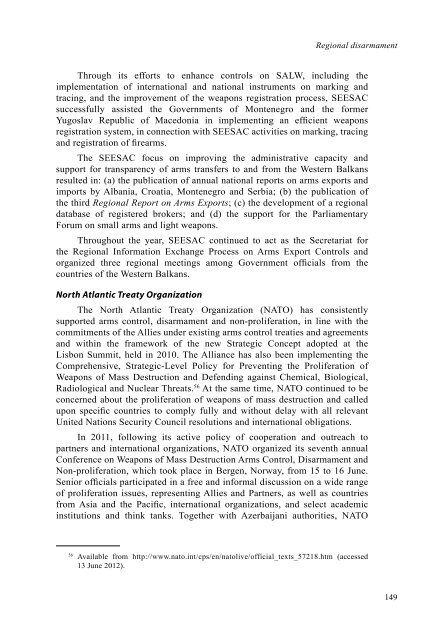DYB2011-Part-II-web
DYB2011-Part-II-web
DYB2011-Part-II-web
You also want an ePaper? Increase the reach of your titles
YUMPU automatically turns print PDFs into web optimized ePapers that Google loves.
Regional disarmament<br />
Through its efforts to enhance controls on SALW, including the<br />
implementation of international and national instruments on marking and<br />
tracing, and the improvement of the weapons registration process, SEESAC<br />
successfully assisted the Governments of Montenegro and the former<br />
Yugoslav Republic of Macedonia in implementing an efficient weapons<br />
registration system, in connection with SEESAC activities on marking, tracing<br />
and registration of firearms.<br />
The SEESAC focus on improving the administrative capacity and<br />
support for transparency of arms transfers to and from the Western Balkans<br />
resulted in: (a) the publication of annual national reports on arms exports and<br />
imports by Albania, Croatia, Montenegro and Serbia; (b) the publication of<br />
the third Regional Report on Arms Exports; (c) the development of a regional<br />
database of registered brokers; and (d) the support for the Parliamentary<br />
Forum on small arms and light weapons.<br />
Throughout the year, SEESAC continued to act as the Secretariat for<br />
the Regional Information Exchange Process on Arms Export Controls and<br />
organized three regional meetings among Government officials from the<br />
countries of the Western Balkans.<br />
North Atlantic Treaty Organization<br />
The North Atlantic Treaty Organization (NATO) has consistently<br />
supported arms control, disarmament and non-proliferation, in line with the<br />
commitments of the Allies under existing arms control treaties and agreements<br />
and within the framework of the new Strategic Concept adopted at the<br />
Lisbon Summit, held in 2010. The Alliance has also been implementing the<br />
Comprehensive, Strategic-Level Policy for Preventing the Proliferation of<br />
Weapons of Mass Destruction and Defending against Chemical, Biological,<br />
Radiological and Nuclear Threats. 56 At the same time, NATO continued to be<br />
concerned about the proliferation of weapons of mass destruction and called<br />
upon specific countries to comply fully and without delay with all relevant<br />
United Nations Security Council resolutions and international obligations.<br />
In 2011, following its active policy of cooperation and outreach to<br />
partners and international organizations, NATO organized its seventh annual<br />
Conference on Weapons of Mass Destruction Arms Control, Disarmament and<br />
Non-proliferation, which took place in Bergen, Norway, from 15 to 16 June.<br />
Senior officials participated in a free and informal discussion on a wide range<br />
of proliferation issues, representing Allies and <strong>Part</strong>ners, as well as countries<br />
from Asia and the Pacific, international organizations, and select academic<br />
institutions and think tanks. Together with Azerbaijani authorities, NATO<br />
56 Available from http://www.nato.int/cps/en/natolive/official_texts_57218.htm (accessed<br />
13 June 2012).<br />
149


